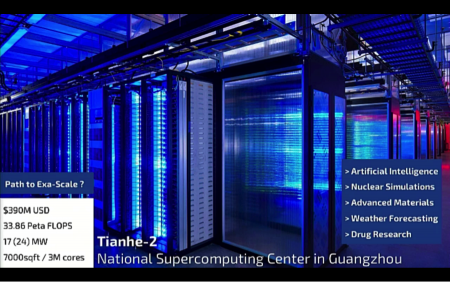October 10, 2016 – Peter Diamandis looks at quantum computing, its implications, and who is working on the technology. Enjoy the read.
What is Quantum Computing?
Moore’s Law (or the exponential growth of integrated circuits) actually refers to the fifth paradigm of computing. A list of those progressive paradigms goes like this:
- Electromechanical
- Vacuum Tube
- Relay
- Transistors
- Integrated Circuits.
Quantum computers represents a sixth paradigm because they work in a fashion entirely different from everything that has gone before.
Classical computers perform operations using classical “bits.” Bits can be in only one of two states: “0” or “1.” In contrast, a quantum computer uses quantum bits, shortened to the term qubits. Thanks to a principle called quantum superposition, qubits can have a value of “0,” “1,” or “both 0 and 1″ at the same time. This capability allows quantum computers to solve certain types of complex problems that are intractable for conventional computers. Frankly, really exciting problems for society today, as you’ll see below.
The power of qubits is they scale exponentially. A 2-qubit machine allows you to do four calculations at once. A 3-qubit machine can do eight calculations. A 4-qubit machine gives you 16 calculations, all simultaneously. By the time you get to 300 qubits, you’ve got a computer that can do more “calculations” than there are atoms in the universe. That’s why the blog TechTarget described Quantum computing this way: “Development of a quantum computer, if practical, would mark a leap forward in computing capability far greater than that from the abacus to a modern day supercomputer, with performance gains in the billion-fold realm and beyond.”
What Are the Implications of Quantum Computing?
The implications of true quantum computing are staggering. Here are my list of the Top 5 Applications:
- Machine Learning: Much of machine learning is about “pattern recognition.” Algorithms crunch large datasets to find signals in the noise, and the goal is to maximize the number of comparisons you make between data to find the best models to describe that data. With quantum computing, we’ll be able to do this processing orders of magnitude more effectively than with classical computing. Quantum computing will allow you to compare much, much more data in parallel, simultaneously, and all permutations of that data, to discover the best patterns that describe it. This will lead to fundamentally more powerful forms of AI, much more quickly than we expect. Expect Quantum Computing to cause a positive inflection point (upward) for the speed at which the world develops AI (which, by the way, is why Google is working so hard on it).
- Medicine: Quantum computing will also allow us to model complex molecular interactions at an atomic level. This will be particularly important for medical research and drug discovery. Soon we’ll be able to model all 20,000+ proteins encoded in the human genome and start to simulate their interactions with models of existing drugs, or new drugs that haven’t been invented yet. Based on the analysis of these drug interactions, we’ll be able to find cures for previously incurable diseases and hopefully accelerate the time to market for new drugs. Using quantum computer simulations will be the way we design and choose our next generations of drugs and cancer cures.
- Chemistry (and Climate Change): Worried about the climate crisis? Wondering what we can do about it? Quantum computers may be our newest tool to understand what is going on and to fight it. They will allow us to unlock “simulation-driven” solutions, perhaps design new catalysts that actually capture carbon from the atmosphere and turn it into new and valuable products at low cost and energy use.
- Material Science & Engineering: Because we can simulate atomic interactions, we’ll explore and invent entirely new, better materials. We might find better superconductors, better magnets, materials that will allow us to create much higher energy density batteries, and so on. Since 2011, the U.S. federal government has granted over $250 million to the Materials Genome Initiative in an effort to “discover, manufacture, and deploy advanced materials twice as fast, at a fraction of the cost.”
- Biomimetics, Energy Systems & Photovoltaics: Scientists believe that much of the world is built atop quantum systems. Processes like photosynthesis, for example, are likely dependent on quantum mechanical systems. Thus, as we look to the natural world for inspiration to build better energy systems or stronger materials, we’ll only fully realize their potential when we can model these processes with quantum computers. This will lead to many advances and discoveries across the board.
Bottom Line: When quantum computing pans out, we’ll be able to control the very building blocks of the universe.
The question is who is going to figure it out first…
Who’s Working on Quantum Computing?
There’s a race going on – a race to prove something called “quantum supremacy.”
Quantum supremacy is essentially the test that validates that the computer you have is in fact a quantum computer. In the United States three major players are in the game right now:
- IBM
- Rigetti Computing, a startup out of Silicon Valley
Perhaps a fourth, D-Wave Systems, located across the border in Vancouver, British Columbia should be added to this list.D-Wave has developed chips with qubits, but these haven’t yet been conclusively proved to operate as a quantum computer. Both Rigetti Computing and Google believe they will reach “quantum supremacy” in the next 12 to 18 months.
Think about that: the next one to two years…The revolution is coming fast.
To put this into perspective, I had a chance to catch up with Chad Rigetti, the CEO of Rigetti Computing (he’ll be one of our amazing mastermind participants at the 2017 Abundance 360 Summit this January).
Below is a picture of the most powerful classical computer on the planet, Tianhe-2 in Guangzhou, China.
It costs $400 million. The computer burns about 20 megawatts of electricity – enough to power 20,000 households. And it’s about half the size of a football field, with 3.2 million Intel cores.
President Obama, in the attempt to drive America’s return to high-performance computing supremacy, declared that the U.S. would build an exoscale computer, 30x more powerful than Tianhe-2, by 2020. The problem with this is that with current technology the cost will be a billion dollars and will require a nuclear power plant to run it.
“We need to do this,” explains Chad Rigetti. “But there is another path. Quantum computing.”
Below is a picture of two developmental systems in Rigetti’s lab in Berkeley, CA.
The big white cans about the size of a human are cooling systems, and inside each cooling system is a single quantum chip. In these machines today, there is a 5-qubit processor. The crazy part: A single chip with about 50 to 60 qubits on it would be more powerful than the entire Tianhe-2, a half-a-football-field-sized machine.
This is what quantum computing unlocks. Rigetti is rapidly developing quantum integrated circuits and the software platform that will allow developers to build on top of them. Along with efforts at Google, IBM, D-Wave, and many other companies and research labs around the world, we are rapidly approaching a quantum computing revolution. Get ready.

















